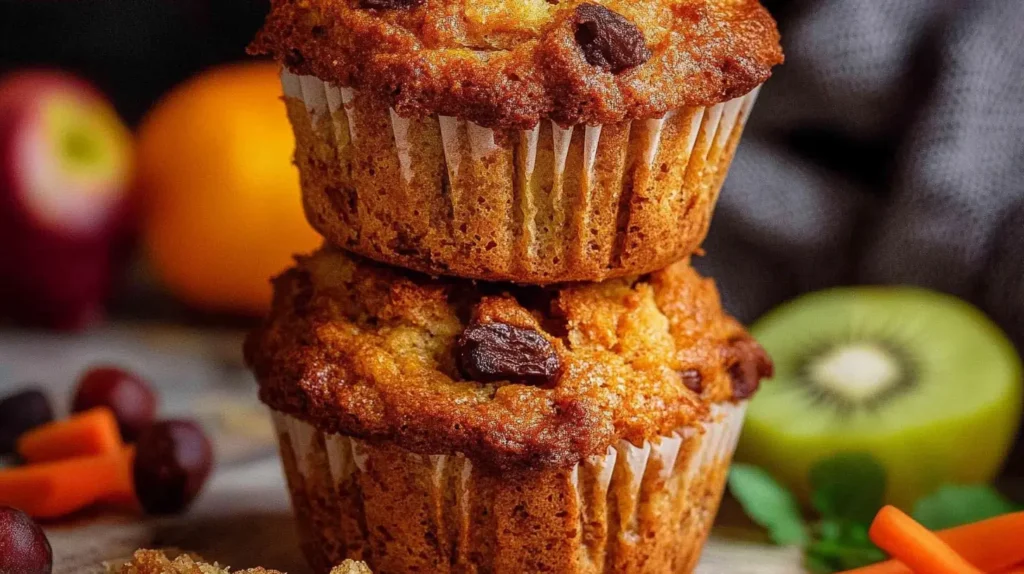
Before we start , in this blog, I provide free recipes that anyone can try, whether you’re a beginner or a seasoned home cook. I believe that cooking should be fun, rewarding, and most importantly, delicious! So, join me as I share my favorite dishes, tips, and kitchen experiments.You may like trendy recipes like Some Kefir for cake for breakfast , or just explore the Breakfast recipe Menu. Let’s cook up something amazing together!
Let’s Start with Muffins Evolution In time
Here’s a quick breakdown of the evolution:
- Pre-20th Century: Early muffin recipes focused on yeast-based muffins, similar to what we now know as English muffins.
- Late 1800s: The introduction of baking powder dramatically changed muffin baking, paving the way for sweeter, quickbread muffins.
- 20th Century: As baking technology improved, so did the varieties of muffins. Cooks started incorporating a plethora of ingredients, from fruits like blueberries and bananas to chocolate chips and spices.
- Health Trends of the 21st Century: Nowadays, many muffin recipes reflect modern dietary preferences, including gluten-free, vegan, and low-sugar varieties.
Baking muffins became more about convenience, and with that came mass production. While bakeries churn out their versions for quick grab-and-go options, I’ve noticed that homemade muffins carry a personal touch that you simply can’t replicate. I remember the first time I baked muffins with my grandmother; the aroma filled the kitchen, and the joy in her eyes was worth every bit of flour that ended up on the floor!
Recipe Evolution Highlights:
| Era | Muffin Type | Key Ingredients |
|---|---|---|
| 18th Century | Yeast-based muffins | Flour, water, yeast |
| Late 19th Century | Quickbread muffins | Flour, milk, baking powder |
| 20th Century | Sweet and savory muffins | Fruits, nuts, chocolate |
| 21st Century | Health-conscious muffins | Whole grains, natural sweeteners |
It’s incredibly fascinating to witness how the muffin has evolved from a simple street food to a versatile treat beloved by many. I often surprise myself with the endless combinations I can create in my kitchen. Whether I’m whipping up a basic blueberry muffin or experimenting with savory options like cheddar and jalapeño, there’s something comforting about knowing I’m partaking in a tradition that spans centuries.
So, the next time you take a bite of your favorite muffin, remember it’s more than just a tasty treat—it’s a part of a historical journey that began centuries ago and continues to evolve today. Now, let’s explore the nutritional aspects of these delightful baked goods.
Nutritional Value of Muffins

After diving into the origins and evolution of muffins, it’s essential to consider their nutritional value, especially if we’re contemplating them as an everyday breakfast option. Are muffins healthy, or do they merely masquerade as a quick breakfast treat? Let’s explore their caloric content and macronutrient breakdown to get a clearer picture.
Caloric Content
When it comes to muffins, the caloric content can be quite surprising. Many people assume muffins are a healthier alternative to pastries or donuts, but the truth is a bit more nuanced. Here’s a quick overview of the caloric content you might find:
- Store-bought Muffins: These typically contain anywhere from 340 to 630 calories each, depending on their size and ingredients. Many commercial muffins are loaded with sugar and refined carbohydrates, making them calorie-dense but not nutrient-rich.
- Homemade Muffins: Making your muffins at home can drastically change their nutritional profile. For instance, a homemade blueberry muffin made with whole wheat flour and natural sweeteners may only have around 150-200 calories, along with added benefits from fiber and protein.
Caloric Comparison Table:
| Type of Muffin | Approximate Calories |
|---|---|
| Store-bought muffin | 340 – 630 calories |
| Homemade fruit muffin | 150 – 200 calories |
| Low-fat option (homemade) | 120 – 180 calories |
I remember the first time I made blueberry muffins at home, experimenting with whole wheat flour and just a touch of honey for sweetness. The result was a delicious treat that felt indulgent but was far more nutritious than those giant coffee shop versions!
Macronutrient Breakdown
Understanding the macronutrient composition of muffins provides deeper insight into their health benefits—or drawbacks. Let’s break down what typically goes into muffins:
- Carbohydrates: Muffins primarily consist of carbohydrates, which can vary significantly based on the ingredients. While refined flours lead to a rapid rise in glucose levels, whole grains offer slower-digesting carbs that help keep you fuller longer.
- Fats: Most store-bought muffins contain unhealthy fats, often from low-quality oils or butter. On the flip side, homemade muffins allow you to choose healthier fats, like olive oil or nut butter, which can be beneficial for heart health.
- Proteins: Many muffins on the market skimp on protein content, but there’s plenty of room to boost this macronutrient in your homemade recipes. Adding ingredients like Greek yogurt, eggs, or protein powder can transform a basic muffin into a comprehensive meal.
Macronutrient Breakdown Table:
| Macronutrient | Store-bought Muffin | Homemade Muffin |
|---|---|---|
| Carbohydrates | 50 – 80g | 20 – 30g |
| Fats | 10 – 27g | 5 – 10g |
| Proteins | 3 – 7g | 5 – 10g |
Although muffins can sometimes trick us into thinking they are a better breakfast option, they can often lead to a sugar crash later in the day if not chosen wisely. I personally prefer whipping up protein-packed muffins that I can freeze and grab on busy mornings.
“Muffins are my secret weapon for busy mornings. I bake a batch on Sunday, and boom—breakfast for the week is sorted. Grab, go, and conquer the day!”
For example, I make a batch with banana, oats, and Greek yogurt that keeps me energized until lunchtime. It’s amazing how a little planning and creativity can make a world of difference in both flavor and nutritional value!
To wrap it up, while muffins can be an easy-to-eat option filled with taste and nostalgia, controlling their calories and macronutrient content is key to making them suit a healthy breakfast. Next, let’s discuss whether muffins are the right choice for breakfast, considering their benefits and potential drawbacks.
Muffins for Breakfast
After exploring the nutritional value of muffins, it’s time to discuss their role as a breakfast option. Muffins have garnered a significant place in breakfast menus around the world, offering a convenient and tasty choice. However, like everything, there are benefits and drawbacks to consider. Let’s dig deeper!
Benefits of Eating Muffins for Breakfast

Muffins can be a delightful addition to your morning routine, especially when made thoughtfully. Here are some of the benefits that I’ve experienced when incorporating muffins into my breakfast:
- Convenient and Portable: they are easy to grab and go, making them a great choice for busy mornings when time is tight. I often bake a batch over the weekend and freeze them for quick breakfasts during the week.
- Nutrient-Rich Options: As mentioned earlier, they can be made healthier by incorporating wholemeal flour, oats, fruits, and nuts. This nutrient boost means you can start your day with a filling option. For instance, I love making banana oatmeal muffins, which are packed with fiber and flavor!
- Versatile Flavors: they are incredibly versatile. You can enjoy sweet muffins (like blueberry or chocolate chip) or savory muffins (like cheese and herb). This variety can help keep your breakfast interesting and cater to different cravings.
- Can Contribute to a Balanced Diet: When made at home, they offer a controlled calorie and sugar count, allowing you to manage your dietary needs more effectively. By adding ingredients like Greek yogurt or nut flour, you can increase protein and healthy fats.
Example Muffin Recipe
Here’s a quick recipe for my go-to breakfast muffins:
| Ingredient | Amount |
|---|---|
| Whole wheat flour | 1.5 cups |
| Oats | 1 cup |
| Mashed banana | 1 cup |
| Greek yogurt | ½ cup |
| Baking powder | 2 teaspoons |
| Eggs | 2 |
| Honey | ½ cup |
| Cinnamon | 1 teaspoon |
Simply mix all ingredients, pour into muffin tins, and bake at 350°F (175°C) for about 20-25 minutes.
These muffins offer a healthy dose of carbohydrates, proteins, and natural sweetness—perfect for kickstarting your day!
Potential Drawbacks
While muffins can be a wonderful addition to breakfast, there are a few potential drawbacks to be mindful of:
- Hidden Sugars and Calories: Many commercially available muffins are akin to cupcakes, filled with excessive amounts of sugar, refined flour, and artificial ingredients. These can lead to energy crashes shortly after eating. For example, I once bought a massive muffin from a coffee shop that packed over 600 calories, leaving me feeling sluggish instead of energized.
- Not Always Filling: Some muffins, especially those made with white flour, may not be very filling. This can result in quick hunger pangs within a few hours after breakfast. If you’re not careful with your muffin choices, you may find yourself snacking sooner than you’d like.
- Sodium Content: Muffins can sneak in high sodium levels due to baking powder and other ingredients. If you’re watching your sodium intake for health reasons, it’s wise to review muffin recipes or ingredient labels closely.
Tips for Healthier Muffins
To mitigate these drawbacks, here are some simple tips I follow:
- Choose Whole Grain: Opt for whole grain flours or oats to enhance fiber content.
- Limit Sugar: Reduce sugar by replacing some with mashed fruits or natural sweeteners.
- Portion Control: Make smaller muffins instead of oversized bakery versions. I use my standard muffin tin but fill it halfway to make regular-sized muffins.
In conclusion, muffins can definitely serve as a healthy breakfast option, especially when you’re mindful of your ingredients and portions. With a little effort in the kitchen, you can enjoy a nutrient-packed muffin without the pitfalls commonly associated with commercial brands. Whether sweet or savory, there’s a muffin for every palate, making them a delightful and convenient choice for breakfast. Now, let’s explore some mouth-watering varieties of muffins you can whip up!
Health Considerations
“Who says muffins can’t be healthy? I love swapping in whole wheat flour, adding oats, or sneaking in some grated zucchini. It’s the perfect way to enjoy a treat without the guilt!”
As we enjoy muffins, it is important to keep health considerations in mind, especially when indulging in sweet options. Here’s how to make muffins a healthier choice:
- Watch the Sugar: Commercial muffins often contain startling amounts of sugar. A normal muffin can range from 20 to 50 grams of sugar or more, which is why I prefer baking my own. By reducing sugar in homemade recipes—using natural sweeteners like applesauce or honey—I can enjoy flavorful muffins without the guilt.
- Nutrient-Dense Ingredients: Opt for whole grains and healthy add-ins like nuts or fruits. Muffins made with whole grain flour and packed with berries or shredded vegetables offer fiber and nutrients that refined counterparts lack. I’ve made a batch of whole wheat blueberry muffins that are not only delicious but also keep me satisfied longer.
- Serving Size Matters: Muffins can be deceiving in size. Many are larger than they used to be, leading to consuming more calories than intended. By using standard-sized pans or even mini muffin tins, I often make smaller portions, allowing me to enjoy a variety without overindulging.
- Healthy Pairing: When I serve muffins as snacks, I like to accompany them with healthy options. A piece of fruit or a side of yogurt complements the muffin well and adds additional nutrients to the meal.
Healthier Muffin Ideas:
| Muffin Type | Features |
|---|---|
| Blueberry Muffins | Packed with antioxidants; reduce sugar by using less sweetener or fruit puree. |
| Zucchini Muffins | Incorporate veggies for added fiber while maintaining sweet flavors. |
| Cornbread Muffins | Use whole cornmeal and add in ingredients like jalapenos or cheese for savory snacks. |
| Banana Nut Muffins | Substitute sugar with ripe bananas for natural sweetness and add protein with nuts. |
In conclusion, muffins can easily adapt to different occasions, whether you enjoy them as a snack, dessert, or even packed into a lunch box. The key is finding the right recipes and ingredients that balance enjoyment with health. So, the next time you find yourself reaching for a muffin, savor it as a treat that can be both satisfying and nourishing! Now, let’s explore the delightful varieties of muffins that showcase this versatility!
Varied Types of Muffins
Having explored the delightful versatility of muffins, let’s now dive into the fascinating world of their flavors and ingredients. Muffins can encompass a wide range of tastes, textures, and culinary inspirations, making them a flexible choice for any meal or occasion. I love experimenting with different combinations, and each one carries its own unique character.
Different Flavors and Ingredients
Muffins can be as diverse as your culinary imagination allows, offering an endless array of flavors and ingredients. Here are some popular choices that I often incorporate when baking:
- Fruits: Incorporating fruits like bananas, blueberries, or raspberries can boost flavor and nutrition. For instance, I always keep some ripe bananas on hand for my quick and easy banana muffins. It’s a great way to use up fruit that might otherwise go to waste.
- Nuts and Seeds: Adding nuts like walnuts or almonds, or seeds such as flaxseed or chia seeds, can enhance both the texture and nutritional profile of muffins. I often top my batter with chopped pecans or sprinkle some chia seeds inside for that extra crunch and healthy omega-3.
- Spices and Extracts: Spices like cinnamon, nutmeg, and vanilla extract can create warm and comforting flavors. Just the other day, I made cinnamon apple muffins that filled the kitchen with a delightful aroma. It was so comforting and delicious!
- Vegetables: Yes, vegetables can also find their way into muffins! Carrot, zucchini, and spinach muffins not only add nutrients but also moisture and flavor. You can’t go wrong with a shredded carrot muffin topped with cream cheese, which is a family favorite during the spring!
- Whole Grains: Using whole grain flours instead of refined ones can increase fiber content and improve the overall health benefits. For example, I frequently swap out some all-purpose flour for whole wheat or oat flour in my recipes.
Here’s a quick Ingredients Summary Table for muffin varieties to illustrate:
| Flavor Profile | Key Ingredients |
|---|---|
| Sweet Berry Muffin | Blueberries, sugar, yogurt |
| Nutty Banana Muffin | Ripe bananas, walnuts, cinnamon |
| Spicy Pumpkin Muffin | Pumpkin puree, nutmeg, cloves |
| Savory Cheese Muffin | Cheddar cheese, chives, flour |
| Veggie Zucchini Muffin | Grated zucchini, olive oil, herbs |
Popular Muffin Varieties

With so many wonderful flavors and ingredients to choose from, let’s also take a look at some classic muffin varieties that have become staples in bakeries and households alike:
- Blueberry Muffins: Perhaps the most iconic muffin, blueberry muffins blend juicy fruit with a moist and tender crumb. They’re perfect with a cup of coffee.
- Chocolate Chip Muffins: These muffins are truly a crowd-pleaser, combining rich chocolate flavor with the deliciousness of freshly baked bread. It’s a great option to indulge in during special occasions or to surprise loved ones.
- Cornbread Muffins: Savory and slightly sweet, cornbread muffins are often enjoyed alongside soups or chili. The texture is crumbly yet hearty, making them perfect for dipping.
- Lemon Poppy Seed Muffins: Bright and zesty, these refreshing muffins are fantastic for brunch or an afternoon snack. I love having them with a cup of herbal tea.
- Pumpkin Muffins: Especially popular in the fall, pumpkin muffins are spiced with warm flavors like cinnamon and nutmeg, featuring moist pumpkin puree that creates a light, fluffy texture.
- Cheese and Herb Muffins: A savory choice, these muffins are infused with sharp cheese and fresh herbs, ideal for brunch or as a side dish for salads. They also make great snacks!
Muffins bring such joy to our tables with their variety of flavors, textures, and ingredients. They allow us to explore both sweet and savory options suitable for any occasion. I have found that by incorporating seasonal fruits and inspirations from different cuisines, I can infuse my muffins with surprises that never cease to excite my family and friends.
In conclusion, whether you’re enjoying a sweet muffin with your coffee or a savory one with your salad, these delightful baked goods can suit every palate and occasion. Next up, let’s explore some recipes and tips to make the perfect muffin!
Recipes and Muffin-Making Tips
After exploring the varied types of muffins and their delicious qualities, it’s time to roll up our sleeves and dive into the practical side of muffin-making! they are not just a staple breakfast item but also a fun baking project that you can customize to fit your taste. Let’s go over a basic muffin recipe and some helpful tips to ensure your muffins turn out perfectly every time.
Basic Muffin Recipe
This simple muffin recipe serves as a foundation for many delicious variations—from sweet fruit muffins to savory cheese ones. Here’s what you’ll need:
Basic Muffin Ingredients:
| Ingredient | Amount |
|---|---|
| All-purpose flour | 2 cups |
| Sugar | ¾ cup |
| Baking powder | 2 teaspoons |
| Baking soda | ½ teaspoon |
| Salt | ½ teaspoon |
| Milk | 1 cup (or buttermilk for extra moisture) |
| Eggs | 2 |
| Unsalted butter (melted) | ½ cup |
| Optional: Flavorings (fruits, nuts, chocolate chips) | as desired |
Directions:
- Preheat the Oven: Preheat your oven to 400°F (200°C) and grease a muffin tin or line it with paper liners.
- Mix Dry Ingredients: In a large bowl, whisk together the flour, sugar, baking powder, baking soda, and salt until evenly combined.
- Combine Wet Ingredients: In a separate bowl, whisk the milk, eggs, and melted butter until combined.
- Combine Wet and Dry: Pour the wet ingredients into the dry ingredients, stirring gently until just combined. Avoid over-mixing; it’s okay if there are a few lumps.
- Add Flavorings: If desired, fold in fruits, nuts, or chocolate chips at this stage. I love adding a cup of blueberries for a classic twist!
- Fill the Muffin Cups: Evenly distribute the batter among the muffin cups, filling each about ¾ full.
- Bake: Bake in the preheated oven for 18–20 minutes, or until a toothpick inserted into the center comes out clean.
- Cool and Enjoy: Let them cool in the pan for about 5 minutes before transferring them to a wire rack to cool completely.
With this base recipe, you can get creative and personalize your muffins with various flavors, spices, and fillings!
Tips for Baking Perfect Muffins
Now that you have your basic muffin recipe, let’s dig into some crucial tips for baking muffins that boast the perfect texture and flavor:
- Separate Wet and Dry: Keeping wet and dry ingredients separate until just combined can help prevent overmixing, which can make your muffins tough. Mix wet ingredients in one bowl and dry in another before combining.
- Add-ins Last: To ensure even distribution and avoid weighing down your batter, always add nuts, fruits, or chocolate chips last.
- Don’t Overfill: Fill the muffin cups only about ¾ full. This allows the muffins to rise nicely without overflowing. I find that a standard ice cream scoop works perfectly for even distribution!
- Use Room Temperature Ingredients: Making sure ingredients like eggs and milk are at room temperature helps create a creamy batter that emulsifies more efficiently.
- Check Oven Temperature: Oven temperatures can vary, so using an oven thermometer can ensure accurate baking. Muffins baked at recommended heat will have a nice dome and tender texture.
- Cooling Time: Allow muffins to cool in the pan for just a few minutes after baking; this helps prevent sogginess. Once transferred to a wire rack, let them cool entirely.
- Experiment with Flavors: Don’t hesitate to swap out ingredients! For instance, you can replace half of the flour with whole wheat flour or substitute yogurt for part of the milk to increase moisture and nutrition.
- Taste Before You Share: As someone who loves to bake for family and friends, I’ve learned the value of taste-testing before serving. Trust your palate to ensure your muffins are just how you like them!
Incorporating these tips can transform your muffin-making into a delightful and consistent experience. Remember, each time you bake, you’re creating something unique, so have fun with it! The journey of perfecting your muffin recipes is just as rewarding as the delicious results. Happy baking!
Print
Are muffins meant for breakfast?
These classic muffins are the perfect blank canvas for your favorite flavors! Light, fluffy, and endlessly customizable, they can be made sweet or savory, loaded with fruits, nuts, or chocolate. Perfect for breakfast, snacks, or dessert, this easy recipe will become your go-to for muffin magic!
- Total Time: 30min
- Yield: 12 muffins 1x
Ingredients
Base Muffin Batter
2 cups all-purpose flour (or whole wheat flour for a healthier option)
½ cup granulated sugar (adjust to taste)
1 tablespoon baking powder
½ teaspoon salt
1 cup milk (or plant-based milk like almond or oat)
½ cup unsalted butter, melted (or vegetable oil)
2 large eggs
1 teaspoon vanilla extract (optional)
Customizable Add-Ins
Sweet Options:
1 cup fresh or frozen berries (blueberries, raspberries, etc.)
½ cup chocolate chips
½ cup diced apples + 1 teaspoon cinnamon
½ cup mashed bananas + ¼ cup chopped nuts
Savory Options:
½ cup shredded cheese (cheddar, mozzarella, etc.)
¼ cup cooked bacon or ham, diced
¼ cup chopped herbs (chives, parsley, etc.)
½ cup grated zucchini or carrots
Instructions
Step 1: Preheat and Prepare
- Preheat your oven to 375°F (190°C). Line a muffin tin with paper liners or grease lightly with butter or oil.
Step 2: Mix Dry Ingredients
- In a large mixing bowl, whisk together the flour, sugar, baking powder, and salt.
Step 3: Combine Wet Ingredients
- In a separate bowl, whisk together the milk, melted butter (or oil), eggs, and vanilla extract (if using).
Step 4: Combine Wet and Dry Ingredients
- Pour the wet ingredients into the dry ingredients and gently fold together until just combined. Do not overmix—a few lumps are okay!
- Fold in your chosen add-ins (e.g., berries, chocolate chips, cheese, etc.).
Step 5: Bake
- Divide the batter evenly among the muffin cups, filling each about ¾ full.
- Bake for 18-20 minutes, or until a toothpick inserted into the center comes out clean.
- Let the muffins cool in the tin for 5 minutes, then transfer to a wire rack to cool completely.
Notes
For a healthier twist, substitute half the flour with whole wheat flour or oats.
Store muffins in an airtight container at room temperature for up to 2 days, or freeze for up to 1 month.
Customize the sweetness level by adjusting the sugar or using alternatives like honey or maple syrup.
- Prep Time: 10min
- Cook Time: 20min
- Category: Breakfast
- Method: Baking
- Cuisine: American
